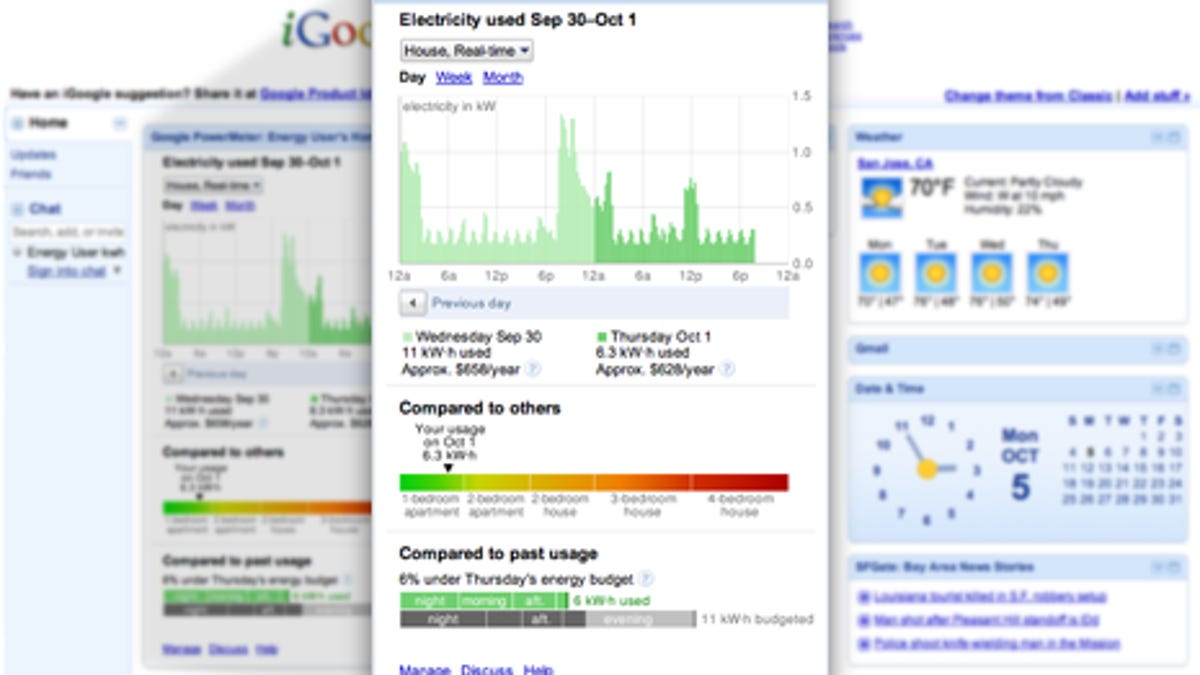Google PowerMeter available to U.K. residents
First Utility, AlertMe, and British Gas offer options for monitoring home energy usage and testing out theories about personal consumption habits.

U.K. residents will now be able to monitor and regulate their home energy usage from any Web-enabled phone or computer regardless of whether their energy provider uses smart meters.
Google announced two U.K. partnerships this week concerning its PowerMeter software, one of which completely bypasses the need for cooperation from an energy provider.
Since the U.K. electricity and gas supplier First Utility began offering customers free smart meters in September 2008, it has had 30,000 customers take them up on the offer. Now, as a result of a Google partnership announced Tuesday, First Utility smart meter customers will have the option of allowing their info to be relayed to Google's PowerMeter so their smart meter data and control can be Web-accessible. The service will become available to Midlands customers in early November 2009, and eventually extend it to the entire U.K.
Google also announced Wednesday that its PowerMeter software will be compatible with AlertMe, a U.K. self-install energy monitoring system that works regardless of a resident's energy provider or the type of meter installed in the home.
Unlike smart meters, the AlertMe system does not communicate with an electricity utility's smart grid to advise on low-peak usage hours. It consists of a meter reader that clips on to a home's existing electric meter, smart plug adapters for appliances, and a wireless hub that plugs into a home's broadband connection. The hub wirelessly communicates between the meter reader, smart plugs, and AlertMe service.
The device's non-evasive nature makes it an option for renters as well as homeowners. And AlertMe is clearly attempting to target that renter market by pointing out in its quirky infomercials (see video below) that its device is unobtrusive. Unlike smart meters, it does require the usual landlord permission to be installed.
The kits costs 69 British pounds ($113) plus a required 12-month contract for its 2.99 pounds-per-month ($4.90) communication service, which requires that the home have broadband access. The total cost, including one free month of service, comes to 101.89 pounds ($167.55).
On Wednesday, the company also announced the start of its trial with British Gas on an AlertMe kit for monitoring and controlling heating from gas that will tie into the gas utility's smart meters. Since AlertMe monitors are now compatible with Google's PowerMeter, the software will be available to British Gas customers who join that smart meter program.
The Google PowerMeter software that ties in to First Utility, AlertMe, and (by default) the British Gas trial program, is currently free. It makes real-time usage data collected from the companies available by cell phone or computer. The data can then be charted in hourly, daily, monthly, and yearly segments for analysis, allowing users to basically conduct their own personal green-living and energy-usage experiments.
A person could test if shutting off their TV and its electronic accouterments for one week, as opposed to leaving them in standby mode, really makes a dent in their home's overall energy consumption. AlertMe subscribers could also use the PowerMeter software to remotely turn specific appliances on or off.
Both AlertMe and First Utility have said they've found their consumers really do tend to adjust their usage habits to save energy and money, once they come face to face with their own usage data.
"At the end of the day, if you can't measure and view your energy use, it's very difficult to make savings," First Utility's CEO Mark Daeche said in a statement.

